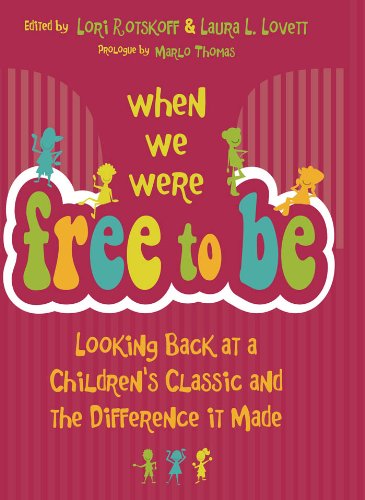
If you grew up during the days of mood rings and lava lamps, you may remember Free to Be…You and Me-the groundbreaking children's record, book, and television special that debuted in 1972. Conceived by the actress and producer Marlo Thomas and promoted by Ms. magazine, this landmark trio of children's media captured the spirit of the growing women's movement and inspired girls and boys to challenge prevailing gender and racial stereotypes. It also encouraged young listeners to value cooperation, respect diversity, and explore the world with curiosity and imagination. In this lively collection marking Free to Be…You and Me's 40th anniversary, thirty-two contributors explore the creation, popular reception, and enduring legacy of this popular children's classic.
When We Were Free to Be offers an unprecedented behind-the-scenes view of Free to Be by its original creators, as well as accounts by activists and educators who changed the landscape of childhood in schools, homes, toy stores, and libraries nationwide. Essays document the rise of non-sexist children's culture during the 1970s and address how the stories, songs, and skits of Free to Be still resonate for parents and children today.
Contributors to this commemorative, insightful collection include: Alan Alda, Laura Briggs, Karl Bryant, Becky Friedman, Nancy Gruver, Carol Hall, Carole Hart, Dorothy Pitman Hughes, Joe Kelly, Cheryl Kilodavis, Dionne Kirschner, Francine Klagsbrun, Stephen Lawrence, Laura L. Lovett, Courtney E. Martin, Karin A. Martin, Tayloe McDonald, Trey McIntyre, Peggy Orenstein, Leslie Paris, Miriam Peskowitz, Deesha Philyaw, Abigail Pogrebin, Letty Cottin Pogrebin, Robin Pogrebin, Patrice Quinn, Lori Rotskoff, Deborah Siegel, Jeremy Adam Smith, Barbara Sprung, Gloria Steinem, and Marlo Thomas.
MEDIA APPEARANCES:
CBC, The Current, "The Free to Be You and Me Movement."
NHPR, Word of Mouth, "Forty Years of Free To Be...You And Me"
Melinda Larose, "When There's Housework to Do," Children's Media Association
Jamie Gumbrecht, "40 Years Later, "Free to Be ... You and Me" at School," CNN Schools of Thought
REVIEWS:
" Finally, a book that takes seriously the kids' record that altered the way a generation saw the world and itself. When We Were Free to Be will likely take you back in time, but the story it tells is of a remarkable moment, in which children were entrusted to shape the future. An exhilarating book about an exhilarating (and catchy!) piece of our popular culture. "
— Rebecca Traister, author of Big Girls Don't Cry: The Election that Changed Everything for American Women, on When We Were Free to Be
" It was hard to change the laws keeping women from equal opportunity. But it's harder still to overcome the internal, culturally learned barriers that lock women--and men--into self-limiting roles at work, at home, and in civic leadership. Free to Be...You and Me showed my daughters they had the power to lead their own dreams. Now, in passionate and touching personal accounts, When We Were Free to Be shows how profoundly this one book has empowered an entire generation. "
— Gloria Feldt, past president of Planned Parenthood Federation of America and author of No Excuses: 9 Ways Women Can Change How We Think About Power , on When We Were Free to Be
" Like the children's classic that inspired it, When We Were Free to Be is a groundbreaking cultural critique wrapped in an inspiring, funny, and creative package. It's filled with incisive reflections on the long-lasting impact of Free to Be and the legacy of feminism. Nothing like it exists. "
— Christina Baker Kline, author and editor of novels and nonfiction books, including Bird in Hand and the forthcoming Orphan Train , on When We Were Free to Be
" In this stunning examination of the cultural impact of Marlo Thomas's classic record album and book, an imposing array of scholars, artists, and activists explain how one set of childhood ideals--highly critical of gender stereotypes and strongly supportive of individuality, tolerance and free play--gave way to today's world of helicopter parents and a commercial culture which inundates young girls with princess fantasies and boys with images of violent, muscled men. Riveting and timely. "
— Steven Mintz, Columbia University, author of Huck's Raft: A History of American Childhood , on When We Were Free to Be
" A revolutionary document breaks with the past, yes, but it also exposes the former taken-for-grantedness of the world it's displacing. Free to Be was a declaration of independence for children's dreams, unshackled by archaic stereotypes that had once seemed timeless truths. That it is seen by some today as obvious or naive is because it so utterly supplanted the previous mindset. This marvelous collection reminds us of that paradigm shift, still gently iconoclastic, while reminding us how far we have yet to go. "
— Michael Kimmel, author of The Gendered Society , on When We Were Free to Be
" A moving reminder that the women's movement was and is ardently pro-child. These fascinating reminiscences and timely essays about what still needs doing to make our children truly 'free to be' will have you singing the songs again--or discovering the joy of learning them. "
— Stephanie Coontz, author of A Strange Stirring: The Feminine Mystique and American Women at the Dawn of the 1960s , on When We Were Free to Be